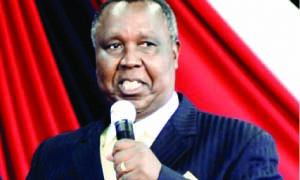By Davis Mulenga–
Why is Zambia’s economy still anemic despite abundance of mineral resources, favourable climate for agriculture and other assets?
Like many Zambians, outspoken televangelist, Pastor Moses Chiluba was also passionately seeking answers to the same question, and was using his weekly television programme, National Matters which he hosts on his broadcast station.
He recently made a blustery assessment of what the nation needed to do to brighten its economic prospects when he hosted economist and investment consultant, Nkrumah Chama-Kalaluka.
According to him, while confronting what was right and wrong was not the “magic bullet”, it was what was required to make people produce positive results in both the public and private sectors.
“I don’t give it a toss. In the end it is lack of being forthright with ourselves on things that are right or wrong that stalls our economic progress. That is the biggest obstacle,” he said.
His guest was more diplomatic: “Only Zambians will develop Zambia sustainably. And we need to optimise our human capital.”
Both Pastor Chiluba and Chama-Kalaluka are both right. And encouragingly, their sentiments of the need to harness the vast skills Zambia possessed to positively transform the economy were also being underlined by aspirants for public office at various levels in the forthcoming 12 August Presidential and General Elections.
There were also some positive developments of economic transformation, too. The bright spots included the massive investment in infrastructure undertaken in the last decade.
The warning signs were the stubbornly high levels of poverty accompanied by lack of productive economic opportunities in both urban and rural areas. Compounding the situation was the shrinking formal sector that employed just over a quarter of Zambians.
Pastor Chiluba says there was no shortage of profound ideas and experienced Zambians to address the vexing economic problems but these needed to be properly channeled to give the nation the power to create an extraordinarily exciting future that would be more rewarding for all citizens.
“With the huge pool of human capital among Zambians, locally and in diaspora, we should not just be struggling along trying to survive,” he says.
Chama-Kalaluka agrees, noting the key was to create an atmosphere which encouraged more people to do things a bit differently.
He says over time even the naysayers would get caught up in the environment, wanting to clearly and openly attach themselves to initiatives that were likely to bring more success to themselves and the nation.
Drawing on his own experience in facilitating investment and trade deals in sectors that included transports and logistics, water and energy, he says investors preferred to know the blunt truth upfront and deal with it head on.
To him, this should be the same with how the nation should go about in creating sustainable opportunities for Zambians. This included deliberately selecting value chains it intended to pursue, the right people, and taking bold actions to achieve set objectives.
He says agriculture, mining and tourism were the three sectors Zambia was well-positioned to exploit in a more powerful way as it strives to build a stellar economy.
“The maize value chain is one example in point. Maize meal production and maize production are not the only value chain nodes. Starch is an important ingredient in food processing and paint manufacturing.
More money can be derived from high value products like starch,” he says.
According to him, the realities of Zambia’s agriculture were that while production was increasing, productivity in the sector still remained low.
Against the background of increased production, he urged more investment in research and development which would help to bring down the cost of inputs. This should be underpinned by mechanisation among small-scale farmers by providing them with access to capital.
“Our agriculture productivity has not been rising. Agriculture production (bumper) arises in the present situation from increased allocation (coverage) of farming inputs like fertilizer, increased use of land and favourable rainfall. In this instance you can well get a high crop production. But the small-scale producer still gets no more than 1.5mt per hectare which is 30 bags. Compare this to 7-10mt per hectare achieved by a commercial farmer.
“The bottom-line is that the most productive farmers are knowledgeable. Zambian farmers must upgrade their knowledge to raise agricultural productivity. On a practical level, the national budget can allocate a research and development component as this would ultimately lead to the reduction for farming inputs in the long-term.”
Chama-Kalaluka says injecting more capital in turbo-charging tourism, especially the northern circuit, should be closely tied to reorgnanising the transport and logistics sector.
“This makeover has already begun with investment in infrastructure. This has huge potential for improvement in the quality of life of many Zambians. The biggest prize lurks in the foreign exchange earnings that the industry could generate,” he says
On copper production, he says Zambia could use a more profitable niche in the value chain rather than the export of ore. He says the manufacturing of electric vehicles would spur increased demand for copper and cobalt.
“Copper might well be the new oil because of the role that will be playing in powering electric vehicles.
Therefore, we must position ourselves to benefit from the electric vehicle value chains,” he says.
Recognising the opportunities was one thing, but pursuing them in unison was another. This was where the memorable ‘always tell it like it’ themes converge to rally the nation in building a more prosperous Zambia.







